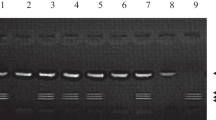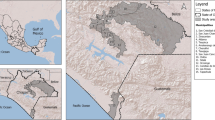Abstract
Background
Metabolic Syndrome (MetS) mainly comprises hyperglycemia, hypertension and dyslipidemia, and has been proven to increase the risk for type 2 diabetes mellitus (T2DM) and cardiovascular disease. Studies have suggested that many factors may be involved in the pathogenesis of MetS, but tumor necrosis factor alpha (TNF- α) may play a strong role as its gene polymorphism was associated with insulin resistance and obesity. The aim of this study was to evaluate the possible association of TNF-α-308 G > A (rs1800629) polymorphism with susceptibility of metabolic syndrome.
Methods
a case-control study was conducted upon 128 participants recruited from Suez Canal University Hospital (Ismailia, Egypt), divided into the MetS group (n = 64) and the control group (n = 64). Genotyping of the TNF-α-308 G > A (rs1800629) polymorphism was performed by restriction fragment length polymorphism (PCR-RFLP).
Results
The A allele was significantly higher among MetS patients (40%) than controls (11%) (p < 0.0001). A significant association was observed between the healthy and MetS groups under the influence of co-dominant, dominant and over-dominant genetic models (p < 0.05). Also, there were positive correlations between TNF-α-308 (G/A) polymorphism and risk factors of metabolic syndrome like body mass index (BMI); fasting blood sugar; cholesterol and low density lipoprotein (LDL) (p < 0.05). Regression analysis was done for predictors of MetS and the A allele was found to be a strong predictor (OR 2.752; 95% CI = 1.106 to 6.847; p = 0.03), as well as, BMI; triglyceride (TG); high density lipoprotein (HDL); LDL and cholesterol (p < 0.05).
Conclusions
TNF-α-308 G > A (rs1800629) polymorphism may be play an important role in the development of metabolic syndrome and A allele is a strong predictor in Egyptians.


Similar content being viewed by others
References
Grundy SM, Cleeman JI, Daniels SR, Donato KA, Eckel RH, Franklin BA, et al. Diagnosis and management of the metabolic syndrome: an American Heart Association/National Heart, Lung, and Blood Institute Scientific Statement. Circulation. 2005;112(17):2735–52.
Stančáková A, Laakso M. Genetics of metabolic syndrome. Rev Endocr Metab Disord. 2014;15(4):243–52.
Kaur J. A comprehensive review on metabolic syndrome. Cardiol Res Pract. 2014;2014:943162.
McCracken E, Monaghan M, Sreenivasan S. Pathophysiology of the metabolic syndrome. Clin Dermatol. 2018;36(1):14–20.
Lau DC, Dhillon B, Yan H, Szmitko PE, Verma S. Adipokines: molecular links between obesity and atheroslcerosis. Am J Physiol Heart Circ Physiol. 2005;288(5):H2031–41.
Lee SC, Pu YB, Thomas GN, Lee ZS, Tomlinson B, Cockram CS, et al. Tumor necrosis factor alpha gene G-308A polymorphism in the metabolic syndrome. Metab Clin Exp. 2000;49(8):1021–4.
Srikanthan K, Feyh A, Visweshwar H, Shapiro JI, Sodhi K. Systematic review of metabolic syndrome biomarkers: a panel for early detection, management, and risk stratification in the west Virginian population. Int J Med Sci. 2016;13(1):25–38.
Mohammadi M, Gozashti MH, Aghadavood M, Mehdizadeh MR, Hayatbakhsh MM. Clinical significance of serum IL-6 and TNF-α levels in patients with metabolic syndrome. Rep Biochem Mol Biol. 2017;6(1):74–9.
Maury E, Brichard SM. Adipokine dysregulation, adipose tissue inflammation and metabolic syndrome. Mol Cell Endocrinol. 2010;314(1):1–16.
Wilson AG, de Vries N, Pociot F, di Giovine FS, van der Putte LB, Duff GW. An allelic polymorphism within the human tumor necrosis factor alpha promoter region is strongly associated with HLA A1, B8, and DR3 alleles. J Exp Med. 1993;177(2):557–60.
Kabita S, Garg PR, Newmei MK, Saraswathy KN, Singh HSJJotPoCS. Tumor necrosis factor-alpha gene polymorphisms and complex disorders: A study among mendelian population with East Asian Ancestry 2019;5(1):35.
Gupta V, Gupta A, Jafar T, Gupta V, Agrawal S, Srivastava N, et al. Association of TNF-α promoter gene G-308A polymorphism with metabolic syndrome, insulin resistance, serum TNF-α and leptin levels in Indian adult women. Cytokine. 2012;57(1):32–6.
Arbab M, Tahir S, Niazi MK, Ishaq M, Hussain A, Siddique PM, et al. TNF-α genetic predisposition and higher expression of inflammatory pathway components in Keratoconus. Invest Ophthalmol Vis Sci. 2017;58(9):3481–7.
Sookoian SC, González C, Pirola CJ. Meta-analysis on the G-308A tumor necrosis factor alpha gene variant and phenotypes associated with the metabolic syndrome. Obes Res. 2005;13(12):2122–31.
You T, Nicklas BJ, Ding J, Penninx BW, Goodpaster BH, Bauer DC, et al. The metabolic syndrome is associated with circulating adipokines in older adults across a wide range of adiposity. J Gerontol Ser A Biol Sci Med Sci. 2008;63(4):414–9.
Lann D, LeRoith D. Insulin resistance as the underlying cause for the metabolic syndrome. Med Clin North Am. 2007;91(6):1063–77 viii.
Pyrzak B, Wiśniewska A, Rymkiewicz-Kluczyńska B. Tumor necrosis factor alpha (TNF-alpha) gene G-308A polymorphism relationship to insulin resistance and lipid abnormalities in children with obesity. Endokrynol Diabetol Chor Przemiany Materii Wieku Rozw. 2006;12(3):171–4.
Ranjith N, Pegoraro RJ, Naidoo DP, Shanmugam R, Rom L. Genetic variants associated with insulin resistance and metabolic syndrome in young Asian Indians with myocardial infarction. Metab Syndr Relat Disord. 2008;6(3):209–14.
Feng RN, Zhao C, Sun CH, Li Y. Meta-analysis of TNF 308 G/A polymorphism and type 2 diabetes mellitus. PLoS One. 2011;6(4):e18480.
Voiculescu VM, Solomon I, Popa A, Draghici CC, Dobre M, Giurcaneanu C, et al. Gene polymorphisms of TNF-238G/A, TNF-308G/A, IL10-1082G/A, TNFAIP3, and MC4R and comorbidity occurrence in a Romanian population with psoriasis. J Med Life. 2018;11(1):69–74.
Rochlani Y, Pothineni NV, Kovelamudi S, Mehta JL. Metabolic syndrome: pathophysiology, management, and modulation by natural compounds. Ther Adv Cardiovasc Dis. 2017;11(8):215–25.
Brown AE, Walker M. Genetics of insulin resistance and the metabolic syndrome. Curr Cardiol Rep. 2016;18(8):75.
Banerjee M, Saxena M. Genetic polymorphisms of cytokine genes in type 2 diabetes mellitus. World J Diabetes. 2014;5(4):493–504.
Alberti KG, Eckel RH, Grundy SM, Zimmet PZ, Cleeman JI, Donato KA, et al. Harmonizing the metabolic syndrome: a joint interim statement of the International Diabetes Federation Task Force on Epidemiology and Prevention; National Heart, Lung, and Blood Institute; American Heart Association; World Heart Federation; International Atherosclerosis Society; and International Association for the Study of Obesity. Circulation. 2009;120(16):1640–5.
Yang Y-H, Liu Y-Q, Zhang L, Li H, Li X-B, Ouyang Q, et al. Genetic polymorphisms of the TNF-α-308G/A are associated with metabolic syndrome in asthmatic patients from Hebei province, China. Int J Clin Exp Pathol. 2015;8(10):13739–46.
Szkup M, Chełmecka E, Lubkowska A, Owczarek AJ, Grochans E. The influence of the TNFα rs1800629 polymorphism on some inflammatory biomarkers in 45-60-year-old women with metabolic syndrome. Aging (Albany NY). 2018;10(10):2935–43.
Stein CM, Song Y, Elston RC, Jun G, Tiwari HK, Iyengar SK. Structural equation model-based genome scan for the metabolic syndrome. BMC Genet. 2003;4(Suppl 1):S99.
Peng Y, Li LJ. TNF-α-308G/A polymorphism associated with TNF-α protein expression in patients with diabetic nephropathy. Int J Clin Exp Pathol. 2015;8(3):3127–31.
Pausova Z, Sedova L, Berube J, Hamet P, Tremblay J, Dumont M, et al. Segment of rat chromosome 20 regulates diet-induced augmentations in adiposity, glucose intolerance, and blood pressure. Hypertension. 2003;41(5):1047–55.
de Luis DA, Aller R, Izaola O, González Sagrado M, Conde R, Romero E. Influence of G308A polymorphism of tumor necrosis factor alpha gene on insulin resistance in obese patients after weight loss. Med Clin (Barc). 2007;129(11):401–4.
Li Y-yJPO. Tumor necrosis factor-alpha g308α gene polymorphism and essential hypertension: a meta-analysis involving 2244 participants. 2012;7(4):e35408.
Zafar U, Khaliq S, Ahmad HU, Lone KP. Serum profile of cytokines and their genetic variants in metabolic syndrome and healthy subjects: a comparative study. Biosci Rep. 2019;39(2).
Funding
This work was done by own author funding.
Author information
Authors and Affiliations
Contributions
All authors have participated in the study.
Corresponding author
Ethics declarations
Author disclosures
The authors declare that they have no conflict of interest.
Consent to participate
All the patients were informed about the research and verbal informed consent was obtained prior to the interview.
Ethical approval
This research has been approved by the Medical Research Ethics Committee of the Suez Canal University Faculty of Medicine (Ismailia, Egypt) and the study has been conducted according to the principles expressed in the Helsinki Declaration.
Additional information
Publisher’s note
Springer Nature remains neutral with regard to jurisdictional claims in published maps and institutional affiliations.
Key messages
• There is an evidence indicates that TNF-α 308 (G/A) polymorphism may participate in development of metabolic syndrome.
• The A allele was found to be a strong predictor as well as, BMI; TG; HDL; LDL and cholesterol for susceptibility of metabolic syndrome in Egyptian patients.
Rights and permissions
About this article
Cite this article
Ghareeb, D., Abdelazem, A.S., Hussein, E.M. et al. Association of TNF-α-308 G>A (rs1800629) polymorphism with susceptibility of metabolic syndrome. J Diabetes Metab Disord 20, 209–215 (2021). https://doi.org/10.1007/s40200-021-00732-3
Received:
Accepted:
Published:
Issue Date:
DOI: https://doi.org/10.1007/s40200-021-00732-3




